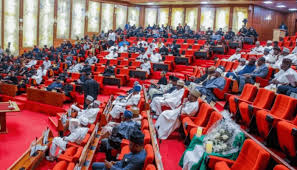The Senate of the Federal Republic of Nigeria has given the Nigerian National Petroleum Company Limited (NNPCL) a one-week ultimatum to provide clear explanations for alleged discrepancies amounting to over ₦210 trillion in its audited financial statements covering the years 2017 to 2023.
The directive was issued during a heated session of the Senate Committee on Public Accounts, chaired by Senator Aliyu Wadada, which was convened to scrutinise the financial activities of the national oil company. During the session, committee members expressed concern over what they described as “mind-boggling” figures contained in the financial statements, particularly under the categories of accrued expenses and receivables.
Present at the session were NNPCL’s Chief Financial Officer, Mr Dapo Segun, and other top officials of the company. They faced tough questions from the lawmakers who were visibly alarmed by the scale of undocumented transactions and unverified financial claims.
According to the committee, the financial reports showed accrued expenses exceeding ₦103 trillion, including over ₦600 billion labelled as retention fees, as well as legal and auditor fees. However, the committee said none of these expenditures were supported by corresponding contract documents or invoices.
Senator Wadada, while addressing the media after the session, stated: “How do you explain retention fees of ₦600 billion with no contract documents to back it? Legal fees are also quoted without any evidence of the legal services rendered. These are not minor errors; they go to the heart of financial accountability.”
In addition to the ₦103 trillion in questionable expenses, another ₦103 trillion was flagged in the receivables section of the company’s audited financials. The Senate Committee described these entries as inconsistent with a fresh document submitted by the NNPCL shortly before the session began.
Wadada said the discrepancies were not speculative but were drawn directly from the company’s own audited reports that have been published in the public domain. “We are dealing with figures that are officially recorded. The NNPCL submitted a fresh version of the figures today that contradicts what is already in the public. This is not only ridiculous—it’s deeply troubling,” he said.
He further questioned the rationale behind signing off on financial statements while internal reconciliation was still ongoing, saying the move was dangerous for Nigeria’s investment image, especially at a time when NNPCL is preparing for an Initial Public Offering (IPO).
“How can reconciliation be pending and you still go ahead to publish audited accounts? These reports are now in the hands of investors and international observers. This can undermine Nigeria’s credibility on the global stage,” he said.
Another critical issue raised during the session was the contradiction between the financial performance of NNPCL and one of its key subsidiaries. The committee noted that while the National Petroleum Investment Management Services (NAPIMS) reported a profit of ₦9 trillion between 2017 and 2021, NNPCL declared a loss of ₦16 billion over the same period.
“This raises serious questions about internal accounting processes and financial transparency,” Wadada said. “How can a subsidiary post such a huge profit and the parent company reports a loss? Something doesn’t add up.”
In light of these revelations, the Senate Committee on Public Accounts issued 11 specific queries to the NNPCL and directed that a comprehensive written response be submitted within one week. The committee warned that failure to address the issues raised would attract further legislative action.
Wadada stressed the importance of fiscal responsibility, especially under President Bola Ahmed Tinubu’s Renewed Hope Agenda, which focuses on accountability, transparency, and the efficient use of public resources.
“At a time when the government is seeking to boost revenue and cut waste, we cannot tolerate such opacity. Nigerians deserve to know how their resources are managed. We will pursue this matter to its logical conclusion. Every naira must be accounted for,” he declared.
The ultimatum adds to the growing pressure on NNPCL to be more transparent, especially since its transition from a government corporation to a limited liability company. Stakeholders and industry analysts have often called for stricter oversight and reform in the operations of the oil company, given its central role in Nigeria’s economy.
The outcome of the Senate’s probe is expected to have major implications for the oil industry, government finances, and investor confidence in Nigeria.
